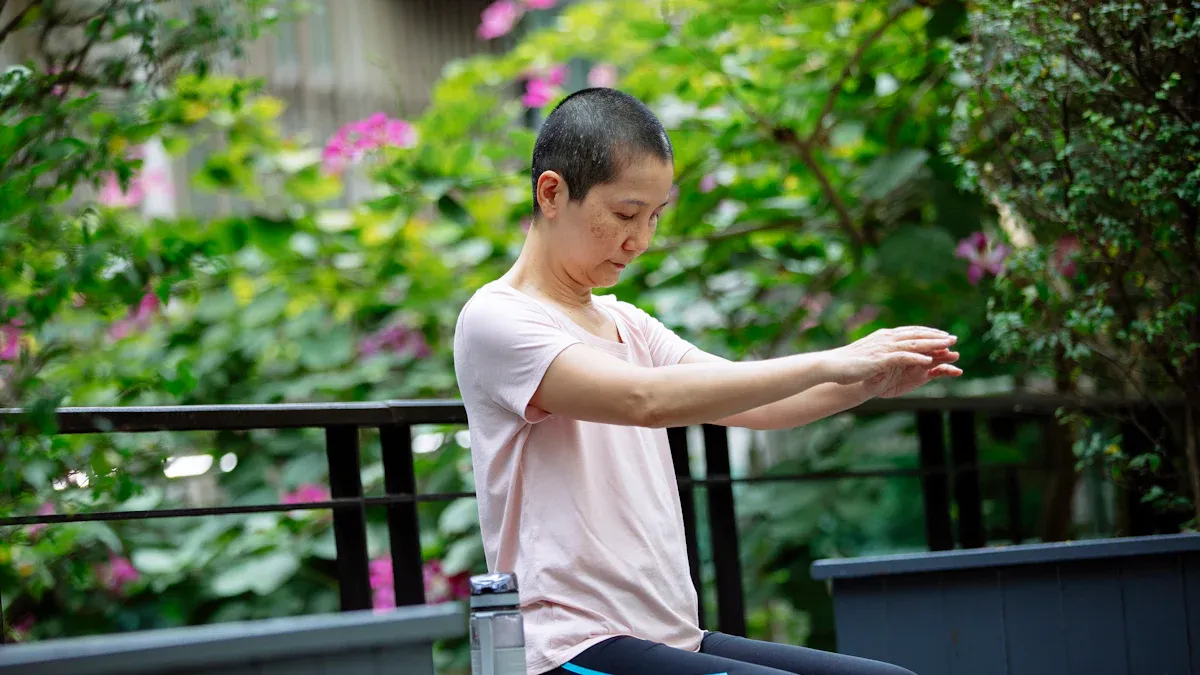Yoga and Tai Chi for Cancer Survivors' Healing

Healing after cancer can feel overwhelming, but Yoga and Tai Chi for Cancer Survivors offer a path to renewal. These practices help you regain strength, calm your mind, and reconnect with your body. Studies show that women practicing Yoga and Tai Chi for Cancer Survivors reduced fatigue by 57%, while inflammation dropped by 20% after three months. Tai Chi also significantly lowered inflammation in breast cancer survivors. By embracing these gentle movements, you can nurture your well-being and take control of your recovery.
Key Takeaways
Yoga and Tai Chi can help lower tiredness and swelling. They help cancer survivors feel more energetic and healthier overall.
These exercises build strength, flexibility, balance, and coordination. They help survivors feel more confident and in control of their bodies while healing.
Adding Yoga and Tai Chi to your daily life can reduce stress, worry, and emotional pain. They bring calmness and help you handle emotions better.
Physical Benefits of Yoga and Tai Chi for Cancer Survivors

Improved Strength and Flexibility
Yoga and tai chi help you rebuild your strength and regain flexibility after cancer treatment. Gentle poses and flowing movements stretch your muscles and joints, making your body feel more open and mobile. Over time, these practices can restore your range of motion, which may have been affected by surgery or prolonged inactivity. You’ll notice your body becoming stronger and more capable with consistent practice. Even simple poses like downward dog or tai chi’s "wave hands like clouds" can make a big difference in how you feel.
Enhanced Balance and Coordination
Balance and coordination often take a hit during cancer recovery. Yoga and tai chi offer a safe way to improve these essential skills. Movements like standing on one leg in tree pose or shifting your weight in tai chi sequences train your body to find stability. This not only reduces your risk of falls but also boosts your confidence in daily activities. As you practice, you’ll feel more grounded and in control of your movements, which can be incredibly empowering.
Reduction in Fatigue and Physical Discomfort
Fatigue and discomfort are common challenges for cancer survivors. Yoga and tai chi provide a gentle yet effective way to combat these issues. A meta-analysis by Duan et al. found that tai chi significantly reduces fatigue in cancer survivors, showing a strong impact on energy levels. These practices also ease physical discomfort by promoting better circulation and reducing muscle tension. As you move through the poses and sequences, you’ll feel your body releasing stress and regaining vitality.
Emotional and Mental Benefits of Yoga and Tai Chi for Cancer Survivors
Stress and Anxiety Reduction
Yoga and tai chi offer a calming escape from the mental strain cancer survivors often face. These practices help you focus on your breath and slow down racing thoughts. Research highlights their effectiveness in reducing stress and anxiety. For example, a review of 29 clinical trials found that low-intensity yoga improves overall health and reduces distress, anxiety, and sleep disturbances.
Study Focus | Findings |
|---|---|
Yoga in Oncologic Care | Yoga reduces distress, anxiety, depression, and fatigue in cancer survivors. |
Tai Chi and Inflammation | Tai chi significantly lowers inflammation in breast cancer survivors. |
By incorporating these gentle movements into your routine, you can create a sense of calm and balance in your life.
Alleviation of Depression and Emotional Strain
Cancer recovery can feel emotionally overwhelming, but yoga and tai chi provide tools to lighten that burden. These practices regulate stress hormones, which can improve your mood and overall outlook. A study from the University of Texas MD Anderson Cancer Center found that yoga enhances quality of life by reducing emotional strain.
Study | Findings | Source |
|---|---|---|
Ohio State University | Fatigue was 57% lower in women practicing yoga. | Link |
University of Texas MD Anderson | Yoga regulates stress hormones and improves mood. |
As you practice, you may notice a shift in your emotional state, feeling lighter and more hopeful.
Promotion of Mindfulness and Emotional Resilience
Yoga and tai chi encourage mindfulness, helping you stay present and grounded. This focus on the "here and now" builds emotional resilience, allowing you to face challenges with greater strength. According to the Society for Integrative Oncology, yoga is recommended for reducing anxiety and improving mood, sleep, and quality of life. Tai chi also promotes mindfulness by combining slow, deliberate movements with deep breathing.
Study | Findings | Benefits |
|---|---|---|
Ohio State University | Fatigue was 57% lower and inflammation reduced by 20%. | Reduces fatigue and inflammation. |
UCLA Health | Tai chi reduces inflammation and treats insomnia. | Improves sleep and lowers risk of disease. |
By practicing these techniques, you can nurture a sense of inner peace and emotional strength, empowering yourself to navigate the healing journey with confidence.
Scientific Evidence Supporting Yoga and Tai Chi for Cancer Survivors
Studies on Fatigue and Sleep Quality
Yoga and tai chi can transform how you feel physically and mentally. Research shows that these practices significantly improve fatigue and sleep quality for cancer survivors. A study published in Cancer Research, Statistics, and Treatment examined tai chi and qigong interventions over 3 to 12 weeks. It involved 1,283 participants, 75% of whom were women. The results highlighted remarkable improvements in energy levels and sleep patterns.
Study | Intervention | Participants | Duration |
|---|---|---|---|
Cancer Research, Statistics, and Treatment | Tai Chi and Qigong | 3 to 12 weeks |
Yoga also delivers powerful results. A study from Ohio State University found that women practicing yoga experienced a 57% reduction in fatigue and a 20% decrease in inflammation after six months.
Study | Intervention | Key Findings |
|---|---|---|
Ohio State University | Yoga | Fatigue was 57% lower, and inflammation reduced by 20% in yoga participants. |
Research on Mental Health and Emotional Well-Being
Yoga and tai chi offer more than physical benefits—they uplift your mental and emotional health. Studies confirm their ability to reduce stress, anxiety, and depression while enhancing overall well-being. For example, a study titled Yoga Can Lower Fatigue, Inflammation in Breast Cancer Survivors revealed that practicing yoga for three months reduced fatigue by 57% and inflammation by 20%. Another study from the University of Rochester Medical Center found that yoga significantly improved sleep and life satisfaction for cancer survivors.
Study Title | Findings |
|---|---|
Yoga Can Lower Fatigue, Inflammation in Breast Cancer Survivors | Practicing yoga for three months led to a 57% reduction in fatigue. |
Yoga Regulates Stress Hormones and Improves Quality of Life for Women with Breast Cancer Undergoing Radiation Therapy | Yoga improved stress hormone regulation and quality of life. |
URMC Study: Yoga Improves Sleep, Quality of Life for Cancer Survivors | Yoga enhanced sleep quality and overall life satisfaction. |
Yoga in Oncologic Care: An Evidence-Based Treatment to Improve Outcomes | Yoga reduced anxiety, depression, and fatigue while improving health. |
Evidence of Long-Term Benefits for Cancer Survivors
The long-term benefits of yoga and tai chi are profound. These practices not only help you recover but also sustain your well-being over time. Research from UCLA Health shows that tai chi reduces inflammation and treats insomnia in breast cancer survivors. Similarly, a study from Brown University found that qigong improved cancer-related fatigue over 10 weeks, offering results comparable to more intensive exercise programs.
Study | Findings |
|---|---|
Ohio State University | Practicing yoga for three months reduced fatigue by 57% and inflammation by 20%. |
University of Texas MD Anderson Cancer Center | Yoga regulates stress hormones and improves quality of life. |
University of Rochester Medical Center | Yoga improves sleep and quality of life for cancer survivors. |
UCLA Health | Tai Chi reduces inflammation and treats insomnia in breast cancer survivors. |
Brown University | Qigong improved cancer-related fatigue over 10 weeks. |
SourcePoint | Tai Chi restores energy, reduces pain, and improves flexibility. |
These findings highlight how yoga and tai chi empower you to take control of your recovery and maintain a healthier, more balanced life.
Practical Tips for Starting Yoga and Tai Chi for Cancer Survivors

Beginner-Friendly Poses and Movements
Starting with simple poses and movements can help you ease into yoga and tai chi. Restorative yoga is an excellent choice for cancer survivors. It focuses on gentle stretches and supported poses that increase strength, flexibility, and energy while reducing pain and stress. For example, child’s pose and seated forward bends are beginner-friendly and accessible for all fitness levels.
In tai chi, movements like "wave hands like clouds" or "parting the wild horse’s mane" are slow and deliberate, making them ideal for beginners. These exercises improve balance and circulation without straining your body.
Yoga Type | Benefits | Accessibility | Target Group |
|---|---|---|---|
Restorative Yoga | Increases muscular strength, flexibility, energy; decreases pain; reduces stress and improves well-being. | Accessible for cancer patients of any age and health status, including those recovering from surgery. | Cancer survivors, especially those with physical limitations or post-treatment. |
Finding Classes or Online Resources
You don’t have to practice alone. Many local studios and online platforms offer classes tailored to cancer survivors. Research shows that group settings enhance the experience by providing support and motivation. Online resources, such as live-streamed or pre-recorded sessions, make it easy to practice from home.
Study Title | Findings |
|---|---|
Can Exercise Reduce the Risk of Cancer Recurrence? | Exercise may reduce the risk of secondary cancers and mortality after treatment. |
Tai Chi reduces risk of inflammatory disease, treats insomnia among breast cancer survivors | Tai Chi led to significant reduction in inflammation compared to cognitive behavioral therapy. |
Look for instructors experienced in working with medical populations. They can guide you safely and adapt movements to your needs.
Tips for Building a Consistent Practice
Consistency is key to reaping the benefits of yoga and tai chi. Start small, even if it’s just 10 minutes a day. Set a specific time for your practice to make it part of your routine. Joining a group class or finding a practice buddy can keep you motivated.
Telemedicine has also made it easier to access yoga and tai chi sessions remotely. This flexibility allows you to maintain your practice even during busy or challenging times. The National Comprehensive Cancer Network recommends yoga for managing symptoms like fatigue, anxiety, and pain. By staying consistent, you’ll notice improvements in your physical and emotional well-being over time.
“Yoga and Tai Chi for Cancer Survivors” offer a gentle yet powerful way to support your recovery. With patience and dedication, you can build a practice that nurtures your body and mind.
Yoga and tai chi offer you a holistic path to healing. These practices improve your physical strength, emotional balance, and mental clarity. Research shows that yoga reduces pain, fatigue, and anxiety while enhancing immune function. Start small, stay consistent, and embrace this journey. You’ll discover profound benefits for your recovery and well-being.
FAQ
What if I’ve never done yoga or tai chi before?
You can start with beginner-friendly poses or movements. Many classes and online resources cater specifically to beginners and cancer survivors.
How often should I practice yoga or tai chi?
Aim for 10–20 minutes daily or a few times weekly. Consistency matters more than duration. Start small and gradually increase your practice time.
Can I practice yoga or tai chi if I have physical limitations?
Absolutely! Both practices can be adapted to your abilities. Restorative yoga and seated tai chi are excellent options for those with limited mobility.
Tip: Always consult your healthcare provider before starting a new exercise routine.
See Also
Recognizing Symptoms and Treatments for Conjunctival Melanoma
Identifying Symptoms and Treatment Options for Duodenal Cancer
An In-Depth Overview of Various Cancer Types Available
Key Features and Insights About Cholangiocarcinoma Explained

